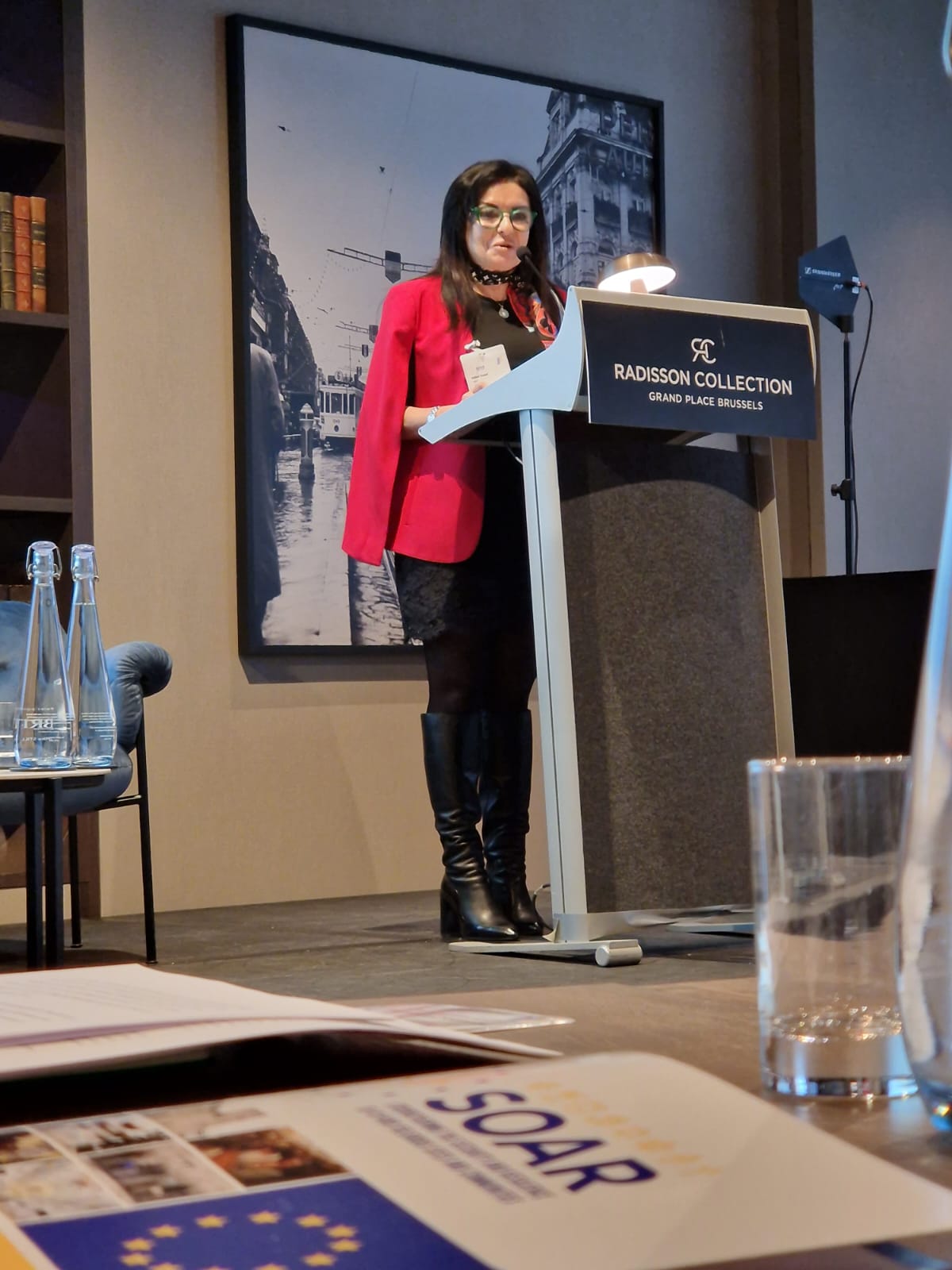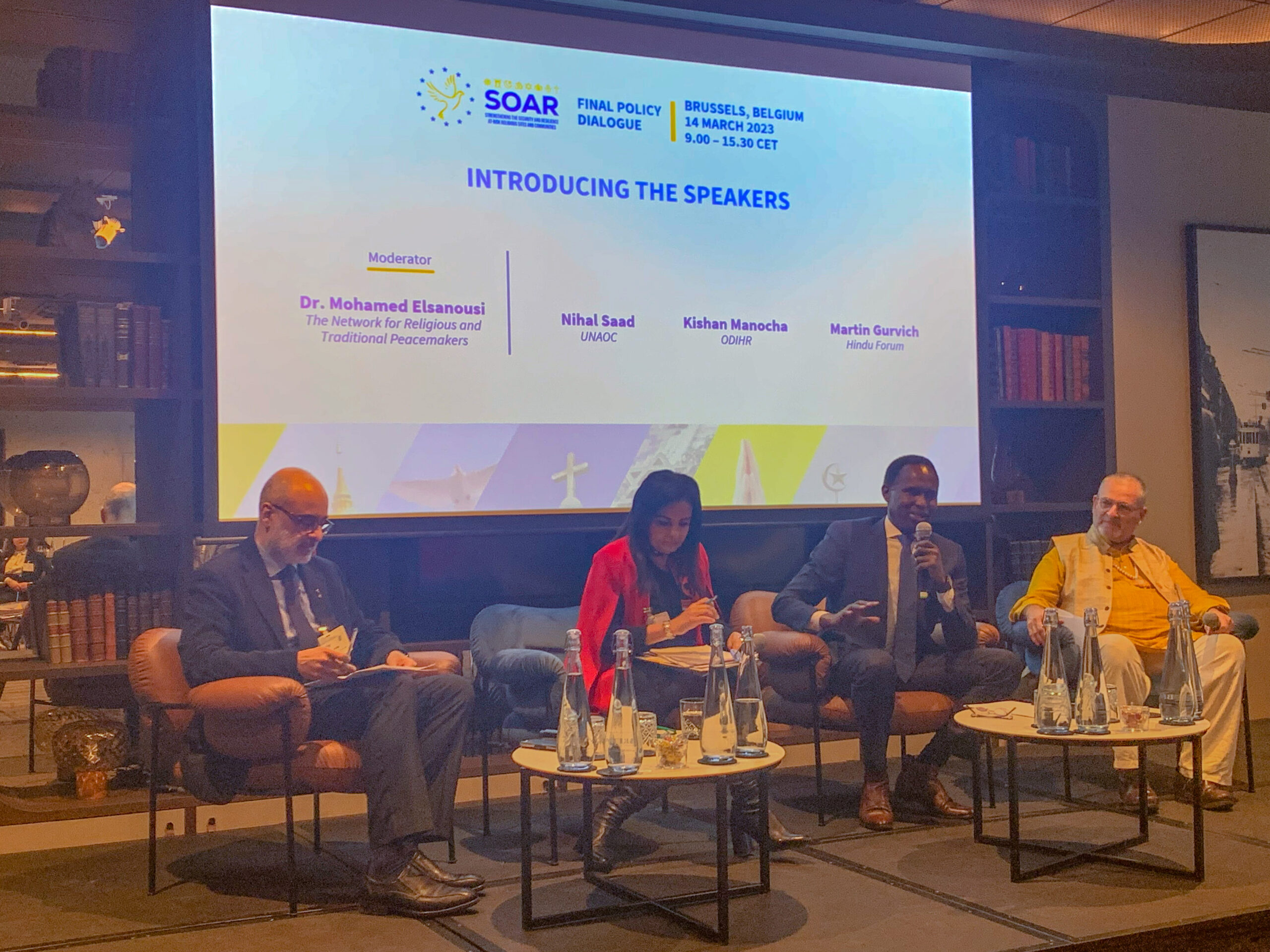SOAR Hosts Final Policy Seminar in Brussels
March 2023
As part of the ‘Strengthening the security and resilience of at-risk religious sites and communities’ (SOAR), the Peacemakers Network and consortium partners EFI and ACE organized a final, hybrid, policy seminar in Brussels to discuss the recommendations of the SOAR policy brief and best mechanisms for dissemination.
The event convened permanent representations to the EU and representatives from international bodies such as EU, OSCE and ODIHR, faith leaders and CSOs. Keynote speaker and SOAR project partner, Ms. Nihal Saad, Chief of Cabinet and Spokesperson for the High Representative for the United Nations Alliance of Civilizations (UNAOC) noted, ‘the engagement of the UN Alliance of Civilizations (UNAOC) in this project emanates from our role as the UN entity which developed the first UN Plan of Action to Safeguard Religious Sites in 2019 and is now leading its implementation.
Launched by the Secretary-General on 12 September 2019, the Plan of Action is anchored in relevant General Assembly, Security Council and Human Rights Council resolutions, as well as key documents agreed upon by religious leaders. The Plan of Action provides a framework for action addressed to all relevant stakeholders to better prevent, prepare for and respond to possible attacks against religious sites. Moreover, the SOAR project has sought to support the Plan and its encouragement of collaboration among stakeholders to build trust, information sharing, partnerships and joint action.

Ms. Nihal Saad, Chief of Cabinet and Spokesperson for the High Representative for the United Nations Alliance of Civilizations (UNAOC) speaking about UNAOC’s engagement in the SOAR project.
The event supported discussions with leading experts on how policy frameworks can support the safeguard of houses of worship and how to support a multistakeholder collaboration between religious actors and law enforcement to strengthen collaboration to address security concerns. Panellists reiterated the need for policy that supports education and awareness to address stereotypes and foster mutual respect and tolerance. This will ultimately strengthen interfaith harmony and cohesive societies. To successfully implement this recommendation, there needs to be a reflection of current policy frameworks and recognize and address the weak points within such frameworks that allow hate speech to perpetuate within communities. This includes adding additional resources to promote inter and intra faith dialogues.
Participants were encouraged by the policy recommendations as a mechanism to strengthen multistakeholder collaboration and mitigate attacks on religious sites. Many emphasized that dialogue is the first step to build trust between faith communities and security officials to foster a common understanding on challenges and solutions to address the security needs for religious sites.

[From left to right] Kishan Manocha, Nihal Saad, Dr. Mohamed Elsanousi, and Martin Gurvish.
After two years of implementation, the SOAR project will conclude in 2023. This project was piloted in seven EU countries, France, Germany, Austria, Netherlands, Belgium, Denmark, and Hungary. Beneficiaries has included religious leaders and worshippers, with tailored trainings targeting women and youth. The interest has remained high throughout the project, with calls for continuation. The attack on a Jehovah’s Witness Hall in Hamburg, just days before the final policy seminar, unfortunately highlighted the need for projects like SOAR. It remains a topical and important issue in the European Union.
About the SOAR Policy Brief
The SOAR Policy Brief was the outcome of seven online national policy dialogues, one in each pilot country, that the Network/SOAR team organized between November 2022 and February 2023. The dialogues convened representatives from each stakeholder group to discuss, share experiences, and formulate policy recommendations to be put forth to local and EU level policymakers, as well as to faith communities. The policy brief was a summary of these discussions and recommendations.
The policy recommendations were discussed in detail throughout the seminar and in different formats. OSCE and faith leaders gave reflections, and two panel discussions were held, one on policy frameworks and their impact, and another addressing the importance of multistakeholder collaboration to combat the threats against religious sites, a key recommendation in the policy brief.
About the SOAR Project
‘Strengthening the security and resilience of at-risk religious sites and communities’ (SOAR) project will contribute to advancing the protection and safeguarding of places for worship, with a focus on communities of worship within the European Union (EU). The SOAR project seeks to increase the awareness of, and capacity to respond to physical and human security threats to places of worship. SOAR will utilize a wide range of communication channels and will provide our audiences with a unique knowledge base. This will include training, guidance, and resources, with the opportunity for virtual engagement and the evolution of virtual networks and communities of practice.
Follow the Network on social!
